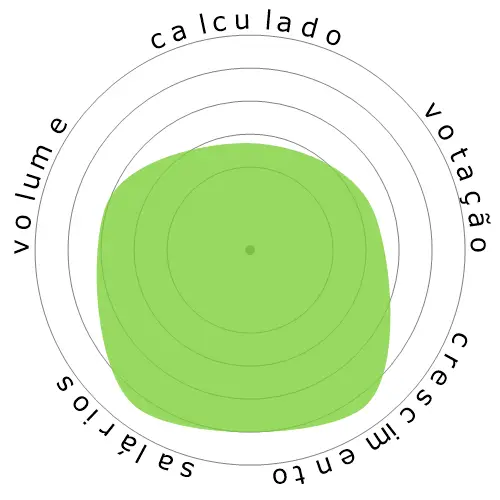Analistas de Segurança da Informação




As pessoas também visualizaram
Risco de automação calculado
Risco Moderado (41-60%): Ocupações com risco moderado de automação geralmente envolvem tarefas rotineiras, mas ainda requerem algum julgamento e interação humanos.
Mais informações sobre o que é essa pontuação e como ela é calculada estão disponíveis aqui.
Enquete do usuário
Nossos visitantes votaram que estão incertos se esta ocupação será automatizada. Esta avaliação é ainda mais apoiada pelo nível de risco de automação calculado, que estima 58% de chance de automação.
O que você acha que é o risco da automação?
Qual é a probabilidade de que Analistas de Segurança da Informação seja substituído por robôs ou inteligência artificial nos próximos 20 anos?
Sentimento
O gráfico a seguir é incluído sempre que há uma quantidade substancial de votos para gerar dados significativos. Essas representações visuais mostram os resultados das enquetes dos usuários ao longo do tempo, fornecendo uma indicação importante das tendências de sentimento.
Sentimento ao longo do tempo (anualmente)
Crescimento
Espera-se que o número de vagas de emprego para 'Information Security Analysts' aumente 32,7% até 2033
Emprego total e estimativa de vagas de emprego
As projeções atualizadas são devidas 09-2025.
Salários
Em 2023, o salário anual mediano para 'Information Security Analysts' foi de $ 120.360, ou $ 57 por hora
'Information Security Analysts' receberam 150,4% a mais do que o salário médio nacional, que era de $ 48.060
Salários ao longo do tempo
Volume
A partir de 2023 havia 175.350 pessoas empregadas como 'Information Security Analysts' dentro dos Estados Unidos.
Isso representa cerca de 0,12% da força de trabalho empregada em todo o país
Dito de outra maneira, cerca de 1 em 866 pessoas são empregadas como 'Information Security Analysts'.
Descrição do trabalho
Planeje, implemente, atualize ou monitore medidas de segurança para a proteção de redes de computadores e informações. Avalie as vulnerabilidades do sistema para riscos de segurança e proponha e implemente estratégias de mitigação de riscos. Pode garantir que os controles de segurança apropriados estejam em vigor para salvaguardar arquivos digitais e infraestrutura eletrônica vital. Pode responder a violações de segurança de computadores e vírus.
SOC Code: 15-1212.00


Comentários
Leave a comment
It'll be a race between red and blue team businesses to implement increasingly better models. Social engineering sure, but meh honestly. Will you be able to find incredibly difficult scraps or oversights the model missed? Will it be worth the risk and investment of the pentester? Overall bleak outlook.
This will increase the ability of automated systems to detect any remaining vulnerabilities, but will not completely remove the need for technicians to maintain, remediate, and upgrade the systems. There will still be a need to touch the hardware. Depending on individual situation, some companies will use more of AI tech than the others. We can already see something similar in the engineering, accounting, and law practice, where paralegals and drafters have not been completely replaced by software. Sole practitioners might use automation more extensively than the large corporations, but there will be a legal requirement for a human audit.
In addition, location-independent digital nomads who train themselves to use the automation tools could do a lot of accurate work in a short amount of time, as independent consultants and freelancers, and do business with multiple clients.
Making the choice to transition from repetitive and tedious manual work to automation, will be akin to transitioning from flintstones to nuclear power. Nuclear power still needs humans, and so will information security solutions.
Deixe uma resposta sobre esta ocupação